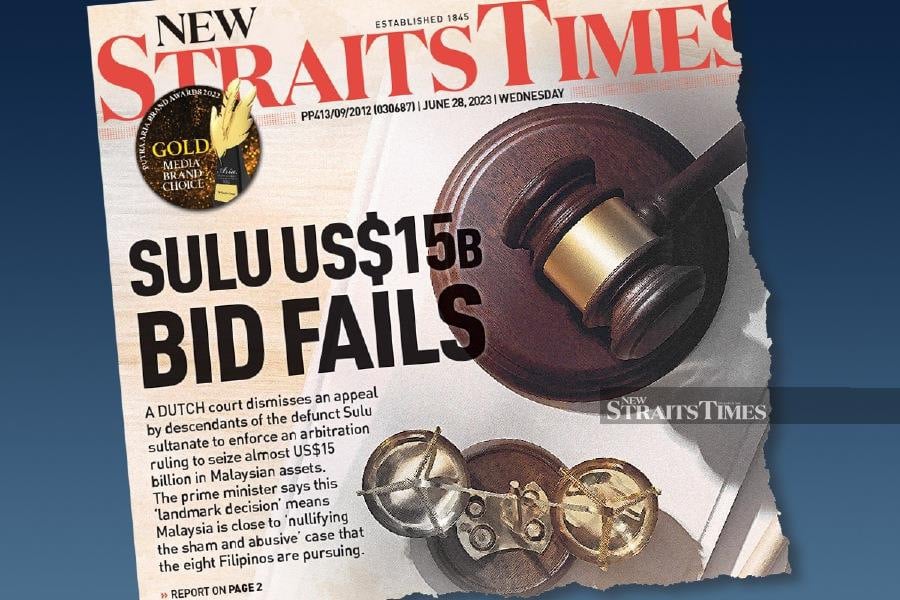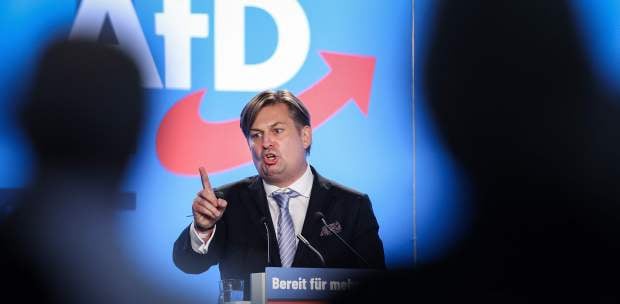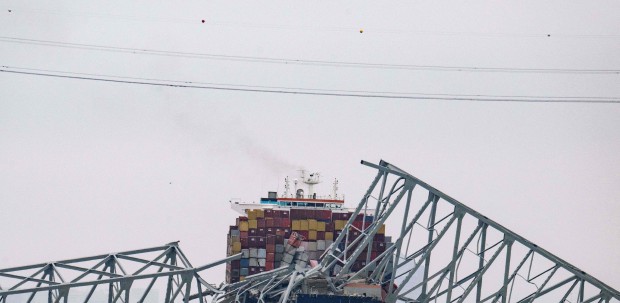KUALA LUMPUR: If the Malaysian government thinks the fight against the purported heirs of the defunct Sulu sultanate is as good as over, it should think again.
This is because the Sulu claimants have not given up just yet.
In fact, their lead counsel, Paul Cohen, said the fight is "far from over".
First of all, he said, they could mount an appeal to the Dutch Supreme Court against the decision of the Court of Appeal.
"Several firms have approached us in the past 24 hours expressing their scepticism about the court decision and offering their services for a Supreme Court appeal. We are considering their proposals," he told the New Straits Times via email.
Cohen had been asked if the matter was considered over after the Dutch court ruled against the claimants in their bid for recognition and enforcement in the Netherlands of an arbitral award of US$14.9 billion by Spanish arbitrator Dr Gonzalo Stampa in France on Feb 28 last year to eight people, who claimed to be the heirs of the sultan of Sulu.
The claims stemmed from what the claimants say was the failure of the Malaysian government to pay an annual cession money for Sabah that was stipulated in an agreement signed between the British and the sultanate.
The token sum, which the government had been paying since the formation of the Federation of Malaysia, was stopped in 2013 after more than 200 supporters of one of several people claiming to be the sultan of Sulu launched an armed intrusion into Lahad Datu in Sabah on Feb 11 that year.
The incident was to last until March 24. A total of six Malaysian civilians and 10 security forces personnel were killed, along with 56 intruders.
The eight claimants, however, have said they had nothing to do with the intrusion and were the true heirs of the sultanate.
The Dutch court, however, threw out the case following a stay on Stampa's final award by the courts in Paris after Malaysia lodged a case against it.
Malaysia had asserted that Stampa's appointment as arbitrator by the claimants had been nullified in Spanish courts.
It was only after the Spanish court decision that Stampa took his decision to France and Malaysia argued that his final award of US$14.9 billion was as such rendered illegal.
With the Dutch decision, the claimants are not allowed to enforce the final award in the Netherlands to seize property belonging to Malaysia or Malaysian companies such as Petronas.
However, Cohen maintains that there will be setbacks for Malaysia in the future.
"This fight is far from over. Enforcement is always a drawn-out process with ups and downs.
"Malaysia has had a good week, but it will have setbacks in the months to come. That's the way this process works.
"There are ongoing actions in France and Luxembourg. Both the government and Petronas have assets frozen or liened as a result of those actions," he said.
Cohen's statement dovetails with what senior Malaysian lawyers have been saying about the case.
While leaders such as Prime Minister Datuk Seri Anwar Ibrahim, Sabah Chief Minister Datuk Seri Hajiji Noor and Minister in the Prime Minister's Department (Law and Institutional Reform) Datuk Seri Azalina Othman Said rejoiced and hailed the Dutch decision, lawyers have said the government must not rest on its laurels as the battle has not been completely won.
Azalina, who chairs the government's special secretariat looking into the Sulu claims, has said the Dutch decision will likely render futile "any further illegitimate attempts" by the claimants to enforce the final award in other jurisdictions.
She also said the decision confirmed Malaysia's position that the "sham arbitration" should never have taken place, as it was "illegitimate from the start".
However, senior lawyers told the NST on Wednesday that Malaysia could not afford to assume that the courts in other jurisdictions would be of the same opinion and refuse to allow the enforcement of the final award in their countries.
Sabah Law Society president Roger Chin has said the government should focus on efforts in Paris to get the arbitral award by Stampa nullified.
This, he added, would assist in proceedings in other countries, though he acknowledged that the Dutch court's decision could influence the Paris courts.
On Malaysia's claims that there was outside influence funding the claimants in their legal battle against Malaysia, Cohen said it was a matter of public record that they were being funded by litigation financiers out of London.






